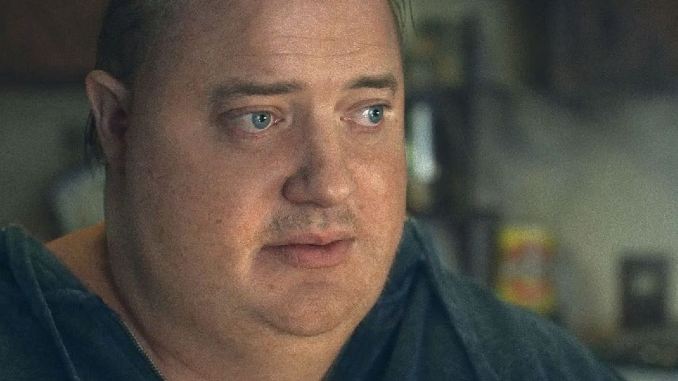Once I had finally wiped away my tears from the ending of Marcel the Shell with Shoes on, I felt inspired to live spontaneously via an impromptu double bill. After hurriedly purchasing my ticket for The Whale, I crossed over to the newly refurbished wing of my local cinema for the first time. Those interested in Bristol news can find more context here, but essentially its 90s aesthetic and standard seating are being replaced by cold walls and recliners. Any atmosphere of watching a film collectively has been removed, bar the everpresent rustling of food, and I can’t say the faux leather ever felt too cosy either.
This impersonal update also presents an apt metaphor. From the welcoming, if slightly off-kilter, presence of Marcel comes the off-putting presentation of Charlie (Brendan Fraser). The camera pans across the morbidly obese man masturbating on the sofa, nearly having a heart attack when missionary Thomas (Ty Simpkins) knocks on the door. Tenured experimental director Darren Aronofsky, making his digital shooting debut, alters the aspect ratio to ensure Charlie is front and centre at all times and takes up most of the screen. We never leave the house setting, displaying a claustrophobic grimy atmosphere as we’re forced to watch him voraciously eat into his limited lifespan.
As Charlie tries to reconnect with his estranged daughter Ellie (Sadie Sink) by doing her English homework, she insults his weight and berates his previous actions. Close friend and nurse Liz (Hong Chau) makes fat jokes in between caring duties and cussing him out for not going to the hospital. Then pile on top the politics of Fraser’s weight gain and wearing fifty kilograms of prosthetics, I am very sympathetic to those labelling The Whale as fatphobic. It’s not necessarily about the film making some audience members feel uncomfortable, which is likely Aronosfky’s intention, but more the exploitative nature that turns Charlie into a spectacle.
The Whale is based on a true story. English teacher turned playwright Samuel D. Hunter wanted his students to “just write something honest”, prompting inspiration as described in his interview with the LA Times. In Playbill, Hunter delves further into his roots as a young homosexual in a Christian school, developing an eating disorder from constant self-loathing. He even addresses the hundreds of reviews discussing fatphobia and makes an astute point: “The history of portrayal of obesity in cinema is very different than in theatre”. The punchline in many a comedy movie has been at the expense of someone’s weight, and maybe we’re finally sick of seeing that.
In fact, I believe the mediums play a bigger role than just their histories. Prior to knowing that the film was an adaptation, it felt like a play as I was watching. Long passages of well-written dialogue taking place in one location can be a great movie as long as it remains engaging. Within a theatre audience, great performances make you feel like you’re on stage with the actors. The lack of a barrier helps to captivate people in their stories and requires less reliance on visual effects. Place it on the big screen however, and the tension from those stories can dissipate when there is less of an atmosphere to hold your attention.
Debating about fatphobia aside, The Whale didn’t work for me because of this final point. The aforementioned cold exterior helped convey a cynical tone from a bunch of unlikable characters. There are plenty of heartwarming moments yet I couldn’t feel them, especially an ending that drew a laugh from another audience member. All of the actors bring their A-game, and the story likely works in a theatre setting, but Aronosfky and the cinematic experience took me out of connecting with any of it.


